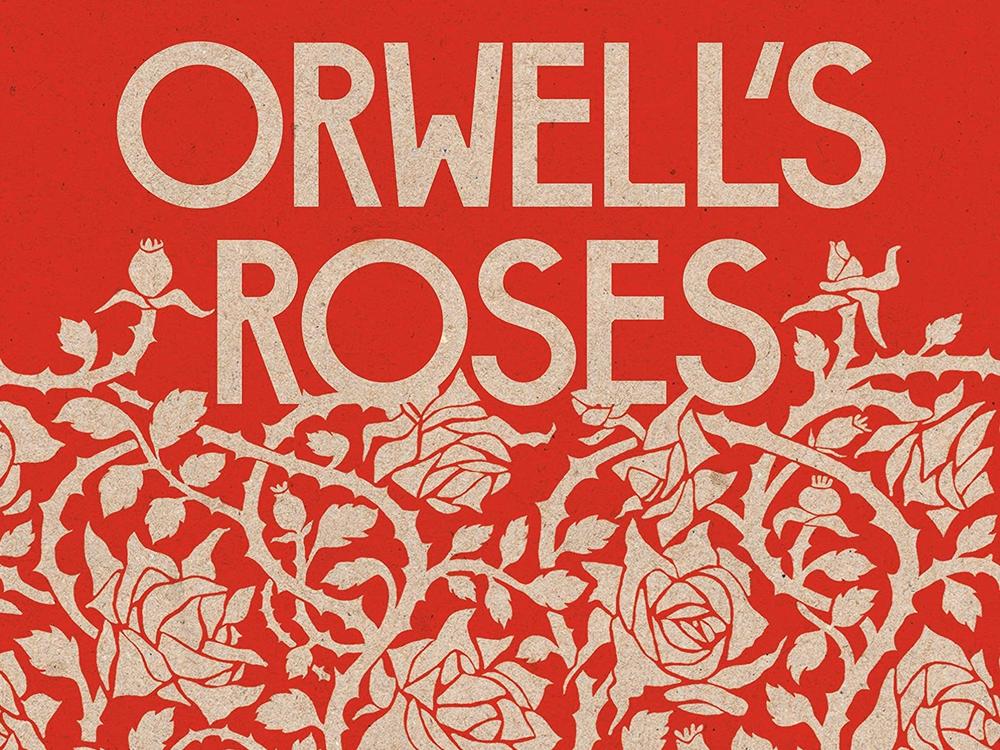Section Branding
Header Content
'Orwell's Roses' centers on the tensions between beauty and labor, joy and suffering
Primary Content
In 1936, a man born Eric Blair, who had rechristened himself George Orwell, planted roses in the garden of a very small, rented country cottage in Wallington, an English village in Hertfordshire.
This declarative sentence is simple, yet it has the potential to evoke a series of questions, rabbit holes an inquisitive person might follow down into a warren of intersecting tunnels. For example: What was 1936 like politically, socially, and economically in England? Where was Orwell in his career then? Or: What did his given name signify and what history did it carry? What significance lay in his chosen nom de plume that over time was used by friends and family as well? And even: What does it mean to plant roses? What role do roses play in our art and culture and history, and, in present day, what does it mean that we can walk into many grocery stores and florists in the United States and find ready-made bouquets of them? Rebecca Solnit — famously interested in context and the interconnectedness of language, cultural ideas, history, and social justice — explores these questions and many more in her new book, Orwell's Roses.
Although the book is not a biography of George Orwell, Solnit does follow his career, includes plenty of biographical details, pays close attention to his writing, and speculates about his psychology. But readers who know little about George Orwell beyond his being the author of Nineteen Eighty-Four should not be put off. The man is, of course, important to the book in that his public and private writing, his ideas, and his gardening serve as the spine that holds together its many disparate ideas. But it could be easily said too that the book is about the relationship between, on the one hand, the human causes of climate change, brutal labor conditions, and totalitarian regimes, and, on the other hand, the struggle for freedom and justice, and the simple joys and pleasures that make such pursuits worthy and sustainable. In other words, it's a deeply political collection of interlinked essays, and at its center are the tensions between beauty and labor, joy and suffering.
Solnit acknowledges early in the book that despite Orwell's commitment to exposing injustice and his anti-authoritarian writing, he was not a perfect man. "He held on to some of the prejudices of his class, his race and nationality, his gender, his heterosexuality, and his era," she writes. It's telling, and fitting, that even though she shares plenty of his political writing, Solnit is especially enamored with Orwell's softer side, his love of toads, gardening, the English countryside, the taste of tea, and the pleasures of a good book (which included, delightfully, "Good Bad Books"). She's vigilant, however, to examine even these pleasures and what they may reveal.
In one of the book's most winding chapters, in which Solnit makes her way from rose-patterned chintz and calico furnishings and clothes to designer Ralph Lauren to various rose breeds to Elton John, she reveals her own Anglophilia by unmasking the sham at the center of "Britishness." Polo, the name of Ralph Lauren's first line, "was a Persian and Indian game before the British picked it up," she writes. "Calico comes from the coastal Indian city of Calicut, from which Europeans exported spices as well as the light cotton fabric. The word chintz first appeared in English in seventeenth-century records of the East India Company and seems to come from an Indian word meaning spray or sprinkle... Even the models for all those English chintz roses were likely the new breeds crossed with the roses that came from China." That mythical idea of Britain, and maybe England especially, "seemed to be a place in which all of us, even [Solnit] growing up in California, had received too much instruction, and also a collage of innumerable pieces of elsewhere."
One of the pleasures of reading Orwell's Roses is its unexpected turns from one subject to the next. Among the many topics Solnit explores are the amount of carbon humans have pumped into the air since industrialization changed the globe; totalitarianism, Stalinism, and the Spanish Civil War; the origin of the political slogan "bread and roses"; Orwell's slaveholder ancestors; Jamaica Kincaid's writing; and Colombia's rose factories, to name just a few. (She also writes of Orwell's lists, which, I realize, have crept into this review.)
Even when the associative leaps evoke, as they do on occasion, some head-scratching, there is an exuberance to them, and it seems, at least to me, that Solnit is having fun when she makes these connections — finding joy in the intellectual pursuit of writing and thinking. That she allows herself to do so in a book that is in many ways very serious too is in keeping with the very aesthetics it's engaging with. "Clarity, precision, accuracy, honesty, and truthfulness are aesthetic values to him, and pleasures," she writes about Orwell. But she may as well have been describing her own, or at least this book's, aesthetic values and pleasures as well.
Ilana Masad is an Israeli-American fiction writer, critic, and founder/host of the podcast The Other Stories. Her debut novel is All My Mother's Lovers.
Copyright 2021 NPR. To see more, visit https://www.npr.org.
Bottom Content




